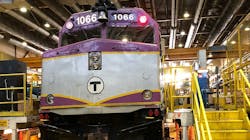More overhauled locomotives and a new Chelsea Station slated for MBTA
The Massachusetts Bay Transportation Authority (MBTA) Fiscal and Management Control Board (FMCB) approved two actions at its April 29 meeting that will move forward the overhaul of additional locomotives and the relocation and construction of a new commuter rail station.
FMCB voted to exercise a contract option with Motive Power, Inc., to overhaul 27 additional F40 commuter rail locomotives. MBTA contracted with Motive Power in 2017 to overhaul 10 of these locomotives in a bid to improve equipment reliability and to support Rail Vision, its strategic plan to identify cost-effective strategies to better support improved mobility and economic competitiveness of the commuter rail system. The first of the overhauled F40s returned to passenger service in March 2019 with the second returned the first week of May and the remaining eight scheduled to return on a rolling basis through August 2019.
“Our investments in our core system continue to increase and are starting to show real results for our customers,” said MBTA General Manager Steve Poftak. “These locomotives will be crucial to improving daily reliability and allow us to operate the system while we plan for the future of commuter rail.”
The MBTA originally purchased F40s in two segments: the first segment included 25 locomotives that were put into service between 1987 and 1988; the second segment of 12 locomotives joined the MBTA’s fleet in 1991.
The option to overhaul the 27 additional locomotives is expected to cost approximately $78.3 million. The first of the option units is expected to be returned to the MBTA by November 2020 with the last of the 27 to be completed by late fall 2021. The program consists of completely rebuilding and refurbishing the F40 models with additional upgrades, including remote monitoring and diagnostics, forward-facing and cab cameras and modern brake and control systems.
In another decision from the April 29 meeting, FMCB awarded A.A. Will Corporation a $32.3-million contract to relocate and construct a new, fully accessible Chelsea Commuter Rail Station.
MBTA says the project aims to relieve traffic congestion and overcrowding on existing area bus routes in Chelsea, while providing better transit options to environmental justice populations through improved accessibility to employment opportunities in downtown Boston and the Seaport district.
“This is a key investment in our commuter rail infrastructure that will allow for faster boarding and improved accessibility for people of all abilities,” said Poftak. “Once complete, the new station will serve as a multimodal connection that will give our customers the choice of traveling to North Station on the commuter rail or South Station on SL3 from a single point.”
Construction could start as early as this summer, with project completion estimated for late 2021. The new Chelsea Station will connect the Newburyport/Rockport commuter rail lines to the Silver Line 3-Chelsea service, which began operating in April 2018.
The new station will feature high-level platforms, canopies, benches and windscreens, in addition to new sidewalks, landscaping, stairways, lighting, communications systems and structures for maintenance and bus operations personnel. The project also includes the demolition of the existing Chelsea Station, upgrades to railroad signal systems and new traffic signal system installations at local intersections.
MBTA notes the project also includes the installation of transit signal priority improvements for the SL3-Chelsea along with improved operational efficiency and the incorporation of green operations elements at the new Chelsea Station. The station also promotes environmental friendliness with greenhouse gas emissions expected to be reduced by increasing the transit mode share and decreasing the idle time of commuter rail and BRT vehicles.
About the Author

Mischa Wanek-Libman
Group Editorial Director
Mischa Wanek-Libman is director of communications with Transdev North America. She has more than 20 years of experience working in the transportation industry covering construction projects, engineering challenges, transit and rail operations and best practices.
Wanek-Libman has held top editorial positions at freight rail and public transportation business-to-business publications including as editor-in-chief and editorial director of Mass Transit from 2018-2024. She has been recognized for editorial excellence through her individual work, as well as for collaborative content.
She is an active member of the American Public Transportation Association's Marketing and Communications Committee and served 14 years as a Board Observer on the National Railroad Construction and Maintenance Association (NRC) Board of Directors.
She is a graduate of Drake University in Des Moines, Iowa, where she earned a Bachelor of Arts degree in Journalism and Mass Communication.
